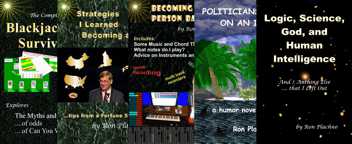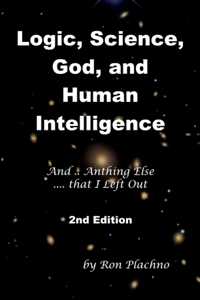|
|||||
|
ARE CHRISTIANS SCIENCE STUPID? That is something I sometimes hear. But how
true is it? I am now 71. Before I reached age 70 my own poll on life
I would call interesting. I had heard several people tell me that
Christians think that the earth is only 5000 years old. Only, those
people, including the two loudest, were not Christians and were
saying it to make fun of them. But oddly, even though I am Catholic,
before age 70, I had never heard a single Christian say that the
earth is only a few thousand years old. In fact, I would have
considered this odd since I have a Science degree. My Electronics
Engineering College degree is a subset of Physics, and I have about
35 years in Science never once myself finding a conflict between
Science and a belief in God. And I still see no conflict there. But
what I did hear from Christians, is that in my last two Catholic
Churches that I attended, the pastor of each said that the universe
was something over 13.7 billion years old. In fact, there is more to
each of these stories. The Church before last was a huge Church and
likely had over one thousand people there that day. No one objected.
I did not hear a murmur, even though I would have found a murmur
response interesting. In my latest Church, that I am still going to,
the pastor not only said that the universe was more than 13.7
billion years old but also said more that surprised me that he even
knew some "more stuff." I will get to it. But I had researched the
"more" even before this pastor said it, which was why I was so
surprised. A wise person should ask, "How do you know
how old the universe is?" As a person who thinks they are a Physics
major, I might answer, "No one ever told me the method, but it would
be Easy Peasy." And why? After the Big Bang theory
became the most plausible theory of the Universe, it makes
universe timing easy to calculate. "Huh?, you ask?" Well, to a
Physics person anyway. You see, the Big Bang theory says that the
universe is expanding, and expanding from a singular point source
where it must have begun. And so, we know the speed of the expansion
today. We, or at least someone, knows where that point source
beginning is. And so since we know that speed times time equals
distance and we know speed and distance, we can figure out time. Now
things might be a bit more complicated. Instead of simple speed it
could be speed plus acceleration plus perhaps a surge (acceleration
of an acceleration) or more, but none of that would stop or even
slow down a real physicist. Nope. I feel certain that is how I would
measure age of the universe. And I suspect that was how it was done.
After all, the other case, that of asking the universe simply how
old it is would be just bad form. Never ask someone or a universe
how old they are. Now that same wise person might then ask,
"Okay, then, who first proposed the Big Bang Theory?" "Ahhh.
Good question," say I. Georges Lemaitre, who published the
theory in the French Language in a Brussels Science journal I
believe in 1927. That was Monsignor Georges Lemaitre, a Catholic
Priest from Belgium, that in fact first gave us the Big Bang Theory
and along with it the tools to figure out how old the universe is.
Hubble who published I believe two years later in 1929 was given
credit for the Big Bang Theory, but still today, many on the
internet say that Lemaitre was first... if that matters. Some scream that Lemaitre should not get
credit since he published in French in a Belgium Science Journal,
sputter, sputter. Well, many did not give him credit but gave it to
Hubble. But one famous person knew of Lemaitre among others who knew
him. That was Albert Einstein. Einstein at first disagreed with
Lemaitre's Big Bang Theory, thinking that the universe was stable
except for orbits of course. Einstein supposedly said something at
the time that might translate to, "Lemaitre's Mathematics is
flawless, but his Physics stinks!" I, for one, who am a huge fan, of
Einstein, found that funny and could visualize Einstein saying that.
But Einstein, great man that he was, over time did agree with
Lemaitre about the expanding universe and the Big Bang theory. I am
not certain of Einstein's timing. But if it was before Hubble, then
that would make not only Lemaitre before Hubble, but perhaps also
Einstein. And so, what then is my point? Certainly
there are some stupid Christians as well as some very bright ones.
That also be said for any other religious choice including those who
choose to not believe in a God at all. Each has some bright people
and some not so bright people. But an overall statement that all
Christians think that the universe is 5000 years old, would be not
only very mean, but also not very intelligent and not keeping with
all of the facts. My advice is do not call any other group names ...
since that, like racism ... will always be not only mean ... but
incorrect. Since age 70, one Christian did tell me that
she thought the universe was only 5000 years old. I told her no,
that it was over 13.7 billion years old. To her credit she asked me
if I was certain, and I said "pretty much so." We were interrupted
before I could give the Physics answer of "it is just speed times
time equals distance." But to her credit, she seemed willing to
listen. And that is more than I can say for some others. And there
you have it. Further advice... I strongly advise to never argue
about evolution versus creationism. Both sides, for my tastes, are
wrong, or at least, not simply accurate.
|
|||||
|
Go to More about this Book by Clicking here please note: "excerpts" of our books shown here are excerpt of our ideas in the books. It will not be word for word. |
|||||

